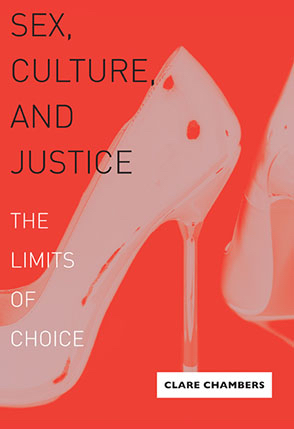all posts on the body and beauty
-
Blending in and standing out: comfort and visibility in beauty practices
 “My thought is this: a significant aspect of beauty practices is comfort and visibility. Comfort relates to discipline: discipline makes some actions and inactions seem comfortable and others effortful. Visibility relates to surveillance: some beauty practices make us seem visible or hyper-visible, others make us feel invisible. Sometimes beauty practices aim at making the practitioner visible: she wants her appearance to be noticeable. But beauty practices can also aim at invisibility: at making a person blend in rather than stand out. Both make up and its absence can have this effect, depending on the person and context involved.”
“My thought is this: a significant aspect of beauty practices is comfort and visibility. Comfort relates to discipline: discipline makes some actions and inactions seem comfortable and others effortful. Visibility relates to surveillance: some beauty practices make us seem visible or hyper-visible, others make us feel invisible. Sometimes beauty practices aim at making the practitioner visible: she wants her appearance to be noticeable. But beauty practices can also aim at invisibility: at making a person blend in rather than stand out. Both make up and its absence can have this effect, depending on the person and context involved.”This short piece is published on the Beauty Demands blog. You can read it here.
-
Cosmetic Procedures: Ethical Issues – one year on
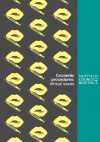 One year since the publication of “Cosmetic Procedures: Ethical Issues” the Nuffield Council of Bioethics has published a report on the impact that publication has had so far. You can read that report here.
One year since the publication of “Cosmetic Procedures: Ethical Issues” the Nuffield Council of Bioethics has published a report on the impact that publication has had so far. You can read that report here.I was a member of the Working Party on Cosmetic Procedures who produced the original report.
- all posts on culture and religion, all posts on liberalism, all posts on the body and beauty, liberalism, multiculturalism and religion, the body
Reasonable Disagreement and the Neutralist Dilemma
 Chambers, Clare, “Reasonable Disagreement and the Neutralist Dilemma: Abortion and circumcision in Matthew Kramer’s Liberalism with Excellence” in The American Journal of Jurisprudence (May 2018).
Chambers, Clare, “Reasonable Disagreement and the Neutralist Dilemma: Abortion and circumcision in Matthew Kramer’s Liberalism with Excellence” in The American Journal of Jurisprudence (May 2018).You can read the paper here.
Abstract: This paper starts by investigating the idea of reasonable disagreement. It then considers Matthew Kramer’s argument that there is no neutral solution available to the disagreement over abortion. The paper argues that Kramer’s account has wider application, and identifies a neutralist dilemma. The neutralist dilemma applies when, of two policy options available to the state, one is unreasonable. It follows that the state should enact only the reasonable policy. However, in a neutralist dilemma the fact of reasonable disagreement due to the burdens of judgment means that it is not possible for the state to act at all, whether legislating or not, without deviating from neutrality. The paper develops the concept of the neutralist dilemma and then applies it to another case discussed by Kramer: infant circumcision. The paper argues that the debate over infant circumcision can be framed as a neutralist dilemma, but that the most plausible resolution of the dilemma results in an argument in favor of the legal prohibition of the practice. This is a surprising result, since most liberal states do not restrict circumcision and since prohibition of circumcision might initially appear to be non-neutral or even illiberal; however it is consistent with the tenets of neutralist liberalism.
-
Neutrality at University of Edinburgh
I presented my paper “Reasonable disagreement and the neutralist dilemma: Abortion and circumcision in Matthew Kramer’s Liberalism with Excellence” at the University of Edinburgh in March 2018. You can read their account of the session on the Just World Institute blog here.
-
Edinburgh Just World Institute blog
The University of Edinburgh Just World Institute blogged about my paper “Reasonable disagreement and the neutralist dilemma: Abortion and circumcision in Matthew Kramer’s Liberalism with Excellence”. You can read the blog here.
-
Cosmetic procedures: ethical issues
 Nuffield Council on Bioethics, 2017
Nuffield Council on Bioethics, 2017This report was written by the Working Party on Cosmetic Procedures, of which I am a member.
There has been increasing demand for invasive cosmetic procedures in the UK, prompting questions about potential risks to users and the lack of regulation and professional standards in this area. This report explores ethical issues in cosmetic procedures with a particular focus on the role and responsibilities of health and scientific professionals and others in responding to demand for invasive non-reconstructive procedures that aim to enhance or normalise appearance. It engages in detailed ethical analysis and makes recommendations affecting all parts of the sector.
You can read the report here.
- all posts on culture and religion, all posts on feminism, all posts on the body and beauty, media, watch
Dress codes at work for the BBC
-
Royal Society of Medicine

I spoke on “The ethics of cosmetic surgery” at the Royal Society of Medicine event “Changing the image of cosmetic surgery: patients before profit” in October 2017. Find details here.
-
Medicalised Genital Cutting and the Limits of Choice
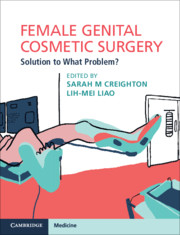 in Female Genital Cosmetic Surgery: Interdisciplinary Analysis and Solution, edited by Sarah Creighton and Lih-Mei Lao (Cambridge University Press, 2019).
in Female Genital Cosmetic Surgery: Interdisciplinary Analysis and Solution, edited by Sarah Creighton and Lih-Mei Lao (Cambridge University Press, 2019).In this chapter I challenge the idea that an appeal to choice exonerates Female Genital Cosmetic Surgery (FGCS). My argument proceeds in five stages. First, I consider the normative role that choice plays in liberal society and philosophy. Second, I note that UK law does not treat choice as adequate for accessing FGCS. Third, I consider the relationship between choice and the concept of normality. Fourth, I consider choice in the context of cosmetic surgery generally, and analyse the distinctive features of FGCS. Fifth, I consider the policy implications of my analysis.
You can find the book here.
-
Judging Women: 25 Years Further Toward a Feminist Theory of the State
Feminist Political Quarterly (Vol. 3 No. 2, 2017).
The title of this paper is “Judging Women”, a phrase that can be understood in three senses. First, when is it acceptable or necessary to make judgements about what women do? Feminists may be wary of subjecting women’s choices and actions to criticism, but the paper argues that such criticism is implied by a feminist perspective on patriarchy, a perspective which is necessarily critical. Second, when can women engage in the act of judging? The paper argues that being judgmental is popularly considered a vice, but only when done by women. Feminism should insist on women’s right to judge. Third, how are we to judge who counts as a woman? The paper investigates the commonalities and contrasts between feminism and trans issues, and discusses the concepts of essentialism and transphobia. The focus throughout is on MacKinnon’s work, which offers profound, sustained, rich analysis of these questions but does not fully resolve them.
You can read the paper here.
-
Genital Autonomy Conference
 I had a profoundly moving and informative time listening and speaking at the Genital Autonomy 14th Annual Symposium on Changing Global Perceptions: Child Protection & Bodily Autonomy. The Symposium was at Keele University on 14-16 September 2016. You can find details of the Symposium here. My talk was titled “Cultural v. Cosmetic v. Clinical Surgery: Challenging the Distinction.”
I had a profoundly moving and informative time listening and speaking at the Genital Autonomy 14th Annual Symposium on Changing Global Perceptions: Child Protection & Bodily Autonomy. The Symposium was at Keele University on 14-16 September 2016. You can find details of the Symposium here. My talk was titled “Cultural v. Cosmetic v. Clinical Surgery: Challenging the Distinction.”There is a general consensus in liberal theory, practice, and law that female genital mutilation (FGM) is a violation of rights and justice that should be banned. However, there is no such consensus about male circumcision or cosmetic surgery, including labiaplasty. These practices are legal in most liberal states and there is no general critique of them in mainstream liberal theory. This talk will consider the philosophical reasons in favour of distinguishing FGM from male circumcision and labiaplasty, and find them wanting. Both cosmetic and clinical surgeries are fundamentally cultural. I argue that male circumcision and cosmetic surgery should be regulated in the same way as FGM – which means, among other things, much stricter regulations on when such surgeries can be performed on children.
-
Nuffield Council on Bioethics Working Party on Cosmetic Procedures
 I am a member of the Nuffield Council on Bioethics Working Party on Cosmetic Procedures. You can find more about the project, including the other members, here.
I am a member of the Nuffield Council on Bioethics Working Party on Cosmetic Procedures. You can find more about the project, including the other members, here.Invasive cosmetic procedures are becoming increasingly popular and accessible in the UK, prompting questions about potential risks to users and the lack of regulation and professional standards in this area.
This project will explore ethical issues in cosmetic procedures with a particular focus on the role and responsibilities of health and scientific professionals and others in responding to demand for invasive non-reconstructive procedures that aim to enhance or normalise appearance.
- all posts on feminism, all posts on social construction, all posts on the body and beauty, chapters, feminism, social construction, the body
Judith Butler’s Gender Trouble
In The Oxford Handbook of Classics in Contemporary Political Theory, edited by Jacob T. Levy (OUP, forthcoming).
This chapter provides a critical introduction to Judith Butler’s classic work Gender Trouble, including an analysis of the impact it has made on political theory.
The chapter is online first and you can read it here.
-
Beauty Demands Workshop
 I’m speaking at the first of four workshops on Beauty Demands in Warwick this March. Find details of the workshop here.
I’m speaking at the first of four workshops on Beauty Demands in Warwick this March. Find details of the workshop here. - all posts on feminism, all posts on social construction, all posts on the body and beauty, listen, media
BBC Radio 4 “Woman’s Hour”
I made a live appearance on BBC Radio 4’s Woman’s Hour, discussing ideas from Sex, Culture, and Justice in the context of a debate on cosmetic surgery and the concept of ‘normal’, on 31st July 2012. You can listen to the debate right here via the sound file below. The segment begins at 33m, I am on at 37m.
-
UK Feminista Thinkpiece
 Edited excerpt from Sex, Culture, and Justice published by UK Feminista as their first Thinkpiece on “Cosmetic Surgery, Culture, and Choice”. Find it here.
Edited excerpt from Sex, Culture, and Justice published by UK Feminista as their first Thinkpiece on “Cosmetic Surgery, Culture, and Choice”. Find it here. -
UK Feminista in The Guardian
- all posts on culture and religion, all posts on feminism, all posts on liberalism, all posts on social construction, all posts on the body and beauty, beauty, feminism, liberalism, multiculturalism and religion, Sex, Culture, and Justice, social construction, the body
Sex, Culture, and Justice: The Limits of Choice
Sex, Culture, and Justice: The Limits of Choice was published in hardback and paperback by Penn State University Press in 2008. An e-book is also available. You can buy all versions here.
Autonomy is fundamental to liberalism. But autonomous individuals often choose to do things that harm themselves or undermine their equality. In particular, women often choose to participate in practices of sexual inequality-cosmetic surgery, gendered patterns of work and childcare, makeup, restrictive clothing, or the sexual subordination required by membership in certain religious groups. In this book, Clare Chambers argues that this predicament poses a fundamental challenge to many existing liberal and multicultural theories that dominate contemporary political philosophy. Chambers argues that a theory of justice cannot ignore the influence of culture and the role it plays in shaping choices. If cultures shape choices, it is problematic to use those choices as the measure of the justice of the culture. Drawing upon feminist critiques of gender inequality and poststructuralist theories of social construction, she argues that we should accept some of the multicultural claims about the importance of culture in shaping our actions and identities, but that we should reach the opposite normative conclusion to that of multiculturalists and many liberals. Rather than using the idea of social construction to justify cultural respect or protection, we should use it to ground a critical stance toward cultural norms. The book presents radical proposals for state action to promote sexual and cultural justice.
Amazon UK: http://www.amazon.co.uk/Sex-Culture-Justice-Limits-ebook/dp/B001UE6M1G/
Amazon US: http://www.amazon.com/Sex-Culture-Justice-Limits-ebook/dp/B001UE6M1G/
Reviews
“[A]n interesting, important, wide-ranging and well-argued book that contains a controversial proposal that will, no doubt, be widely debated.”
—Times Higher Education“[A]n important book. … Very few first-rate analytical thinkers … engage with social theorists: Chambers is a notable exception, and if only for that reason, her contribution should serve as a model for any endeavour of this kind. … Moreover, its strength lies not merely in the author’s mastery of two disparate intellectual traditions, but also in its cogent and provocative defence of a number of proposals.“
—Philosophy“[E]xtremely successful. … Testament to her scholarly rigour, Chambers skilfully avoids alienating either side of the academic divide [between analytical and continental philosophy]; achieving her stated aim, she undermines the foundations upon which such divides are rooted. … This opportune and tightly argued work reveals the extent to which equality and justice cannot be guaranteed by a political liberalism which venerates autonomy to the exclusion of other important values. Setting itself apart from other work in its field, this book forms, albeit on its own terms, part of the solution.”
—Feminist Theory“Chambers’ work makes a highly valuable contribution to contemporary philosophical debates. … Chambers’ work represents a great advance in attempting to forge a path between two positions which are so often considered to be diametrically opposed. The project … is a vital one. … [T]he value of the theoretical contribution, both to liberal and feminist philosophy, is indisputable.”
—Res Publica“Her interwoven arguments … are complex, meticulous and inventive. … [T]here is real potential here for this book to alter mainstream liberal thinking.”
—Feminist Review“An incisive, well-written book with a sustained, original argument.”
—Ruth Abbey, University of Notre Dame“The book contributes significantly to the literature of liberalism, autonomy, and feminism.”
—Ann Cudd, University of Kansas“Chambers’ refreshing approach has the potential to expand the scope of conventional liberal theory by showing how liberals can (and should) directly meet the challenge of postmodern approaches and by demonstrating that feminist contributions are the well from which most innovations in liberalism are drawn.”
—Avigail Eisenberg, University of Victoria - all posts on culture and religion, all posts on feminism, all posts on the body and beauty, articles, feminism, liberalism, multiculturalism and religion, the body
Autonomy and equality in cultural perspective: Response to Sawitri Saharso
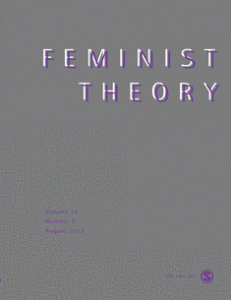 Feminist Theory Vol. 5 No. 3 (December 2004).
Feminist Theory Vol. 5 No. 3 (December 2004).This paper criticises Sawitri Saharso’s argument that hymen repair surgery and sex-selective abortion can be both multiculturalist and feminist policies.
You can read the paper here.
- all posts on culture and religion, all posts on feminism, all posts on liberalism, all posts on social construction, all posts on the body and beauty, articles, beauty, feminism, the body
Are breast implants better than female genital mutilation? Autonomy, gender equality and Nussbaum’s political liberalism
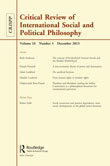 Critical Review of International Social and Political Philosophy (CRISPP) Vol. 7 No. 3 (Autumn 2004).
Critical Review of International Social and Political Philosophy (CRISPP) Vol. 7 No. 3 (Autumn 2004).This paper outlines two forms of autonomy, and argues that political liberals such as Martha Nussbaum wrongly prioritise second-order autonomy. As a result, they cannot provide adequate criticism of unjust social norms. The two cases of breast implants and female genital mutilation are compared to illustrate this point.

 Can your employer demand that you go to work naked? In this short
Can your employer demand that you go to work naked? In this short 



